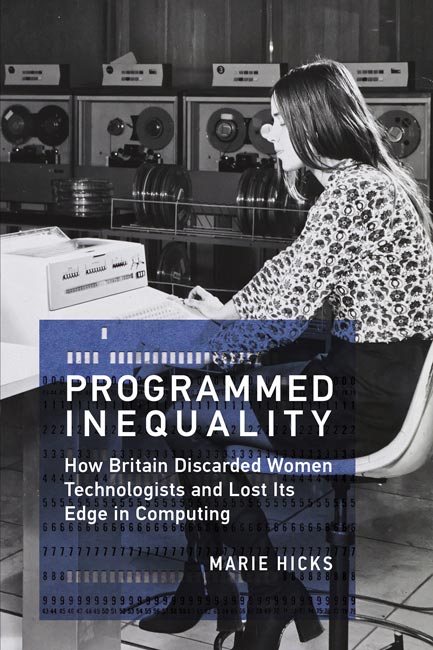 Programmed Inequality Programmed Inequality
How Britain Discarded Women Technologists and Lost Its Edge in Computing by Marie Hicks
Marie Hicks
Narrated by Becky White
Available from Audible
Book published by The MIT Press
How Britain lost its early dominance in computing by systematically discriminating against its most qualified workers: women.
In 1944, Britain led the world in electronic computing. By 1974, the British computer industry was all but extinct. What happened in the intervening thirty years holds lessons for all postindustrial superpowers. As Britain struggled to use technology to retain its global power, the nation's inability to manage its technical labor force hobbled its transition into the information age.
In Programmed Inequality, Marie Hicks explores the story of labor feminization and gendered technocracy that undercut British efforts to computerize. That failure sprang from the government's systematic neglect of its largest trained technical workforce simply because they were women. Women were a hidden engine of growth in high technology from World War II to the 1960s. As computing experienced a gender flip, becoming male-identified in the 1960s and 1970s, labor problems grew into structural ones and gender discrimination caused the nation's largest computer user—the civil service and sprawling public sector—to make decisions that were disastrous for the British computer industry and the nation as a whole.
Drawing on recently opened government files, personal interviews, and the archives of major British computer companies, Programmed Inequality takes aim at the fiction of technological meritocracy. Hicks explains why, even today, possessing technical skill is not enough to ensure that women will rise to the top in science and technology fields. Programmed Inequality shows how the disappearance of women from the field had grave macroeconomic consequences for Britain, and why the United States risks repeating those errors in the twenty-first century.
Marie Hicks is Assistant Professor of the History of Technology at the University of Wisconsin–Madison.
REVIEWS:
“In this volume, Hicks has delivered a sophisticated work of scholarship: detailed, insightful, deeply researched.... But the book has a much wider relevance, too, which it would be unwise to understate. Discussing, as it does, the role of profoundly structural gender discrimination in the collapse of technical dominance by a formerly great power, this book makes very uncomfortable reading – on a number of levels.”
—Times Higher Education “Fans of the movie Hidden Figures may be interested in this scholarly analysis of goings on across the Atlantic, by an historian of science at the Illinois Institute of Technology. Her deep dive into 'how Britain discarded women technologists and lost its edge in computing,' the subtitle, is a sobering tale of the real consequences of gender bias—a problem that persists in many technical fields today.”
—Harvard Magazine “This is a fascinating and disturbing account of women's roles in the British computing industry's rise and fall. In its analyses of job classifications and campaigns for equal pay, this study examines relationships between gender and computing in far greater detail than previous accounts. Deeply researched and persuasively argued, Hicks's study of computing in Britain complements existing accounts of women's exclusion from the US computing industry—and offers important lessons for the tech industries of both nations today.”
—Jennifer S. Light, Department Head and Professor of Science, Technology, and Society, MIT
|

